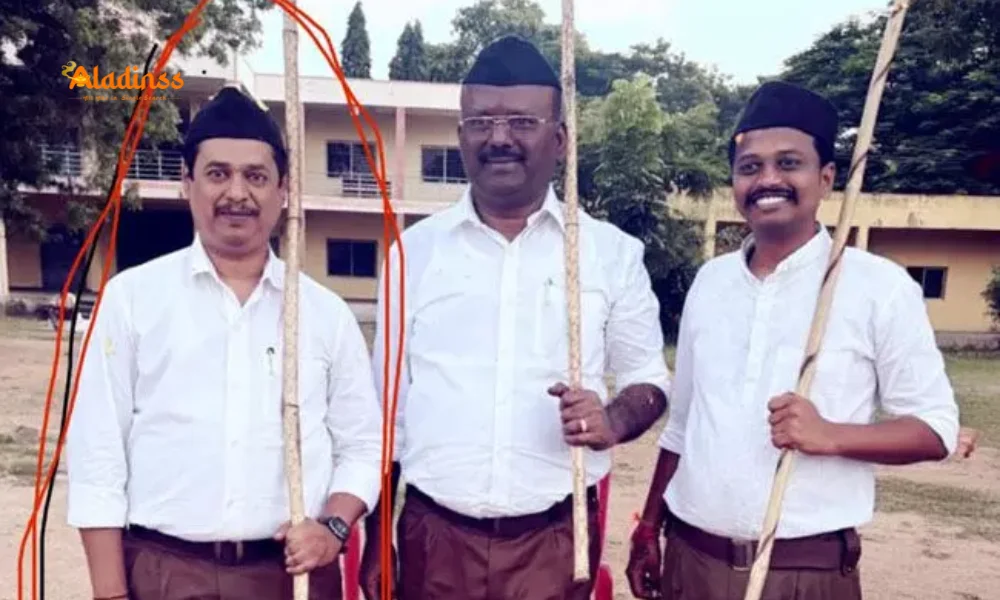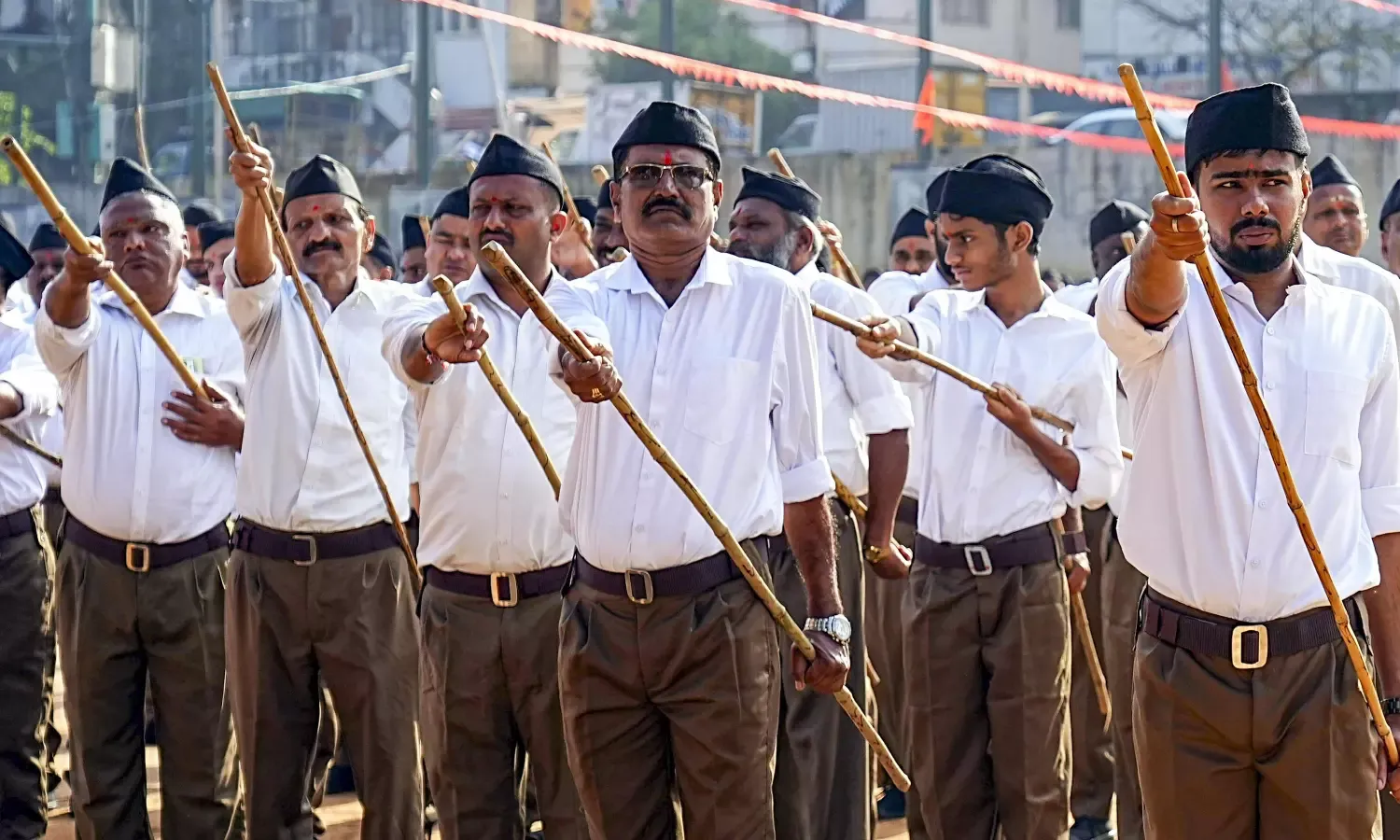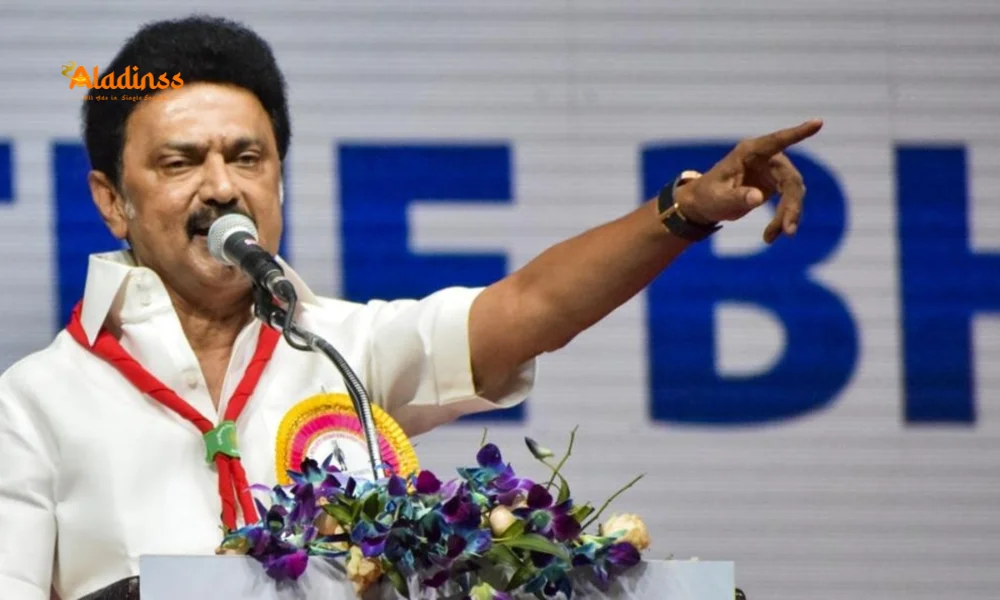Karnataka PDO Faces Suspension After Participating in RSS Event, Reports Say

Karnataka PDO Suspended for Attending Raichur RSS Event
A Panchayat Development Officer (PDO) in Karnataka’s Raichur district, Praveen Kumar KV, has been suspended for allegedly participating in a uniformed RSS event, sparking controversy over government officials’ involvement with the Rashtriya Swayamsevak Sangh (RSS). The suspension, ordered by the Karnataka Department of Rural Development and Panchayat Raj (RDPR), follows a directive from Minister Priyank Kharge to Chief Minister Siddaramaiah, urging action against officials associated with the RSS. The move reflects Karnataka’s recent push to curb RSS activities in government spaces, citing violations of civil service conduct rules.
The suspension order, issued by Dr. Arundhathi Chandrashekhar, Commissioner of the Panchayat Raj Department, cites a breach of the Karnataka Civil Services (Conduct) Rules, 2021. It accuses Praveen Kumar, stationed at Sirawar Taluk Panchayat, of participating in an RSS patha sanchalana while wearing the organization’s uniform, an act deemed a violation of rules prohibiting government servants from engaging with organizations involved in political activities. The case has ignited debates about the role of RSS in Karnataka and the enforcement of civil service regulations.
Details of the Suspension Order
The suspension order explicitly references Rule 5(1) of the Karnataka Civil Services (Conduct) Rules, 2021, which bars government employees from being members of or associating with political organizations. The order states that Praveen Kumar’s participation in the RSS event, specifically the patha sanchalana, constitutes a clear violation of these regulations. The RSS, widely regarded as a Hindu nationalist organization with political affiliations, has been under scrutiny in Karnataka, particularly after the state government’s recent decision to restrict its activities in public spaces.

The order, issued under the Karnataka Civil Services (Classification, Control and Appeal) Rules, 1958, mandates that Praveen Kumar remain suspended pending a detailed inquiry into his conduct. During this period, he is prohibited from leaving his headquarters in Sirawar without permission from the competent authority. The suspension underscores the Karnataka government’s commitment to enforcing discipline among civil servants and ensuring compliance with regulations that prohibit involvement in politically charged activities.
Karnataka’s Crackdown on RSS Activities
The suspension of Praveen Kumar comes in the wake of a broader state government initiative to curb RSS activities in government and public spaces. On October 16, 2025, the Karnataka cabinet decided to ban private organizations, particularly the RSS, from conducting activities in government and government-aided schools, colleges, and public premises. This decision was driven by concerns over the RSS’s perceived political activities, which the state government argues are incompatible with the neutrality expected of public institutions.
Minister Priyank Kharge, who oversees the RDPR department, played a pivotal role in pushing for action against government officials associated with the RSS. In a letter to Chief Minister Siddaramaiah, Kharge highlighted the need to enforce the Karnataka Civil Services (Conduct) Rules, emphasizing that government employees must remain impartial and avoid affiliations with organizations engaged in political activities. The suspension of the PDO in Raichur is seen as a direct outcome of this directive, signaling the government’s intent to crack down on such associations.
Context of the RSS in Karnataka
The Rashtriya Swayamsevak Sangh, founded in 1925, is a Hindu nationalist organization that promotes cultural and ideological values aligned with Hindutva. While the RSS describes itself as a cultural organization, critics, including the Karnataka government, argue that its activities often carry political undertones, given its close ties to the Bharatiya Janata Party (BJP). In Karnataka, the RSS has a significant presence, organizing events like shakhas and patha sanchalanas, which involve drills, marches, and community activities.
The state government’s decision to restrict RSS activities in public spaces has sparked heated debates, with the BJP accusing the ruling Congress government of targeting the organization for political reasons. The suspension of Praveen Kumar has further intensified this controversy, with some viewing it as a necessary step to uphold civil service neutrality, while others see it as an overreach that infringes on personal freedoms. Social media platforms like X have been abuzz with discussions, reflecting polarized opinions on the issue.
Legal Framework and Civil Service Conduct
The Karnataka Civil Services (Conduct) Rules, 2021, form the legal basis for the suspension of Praveen Kumar. Rule 5(1) explicitly prohibits government servants from associating with political parties or organizations engaged in political activities. The rule states that civil servants must not participate in political movements, solicit support for such organizations, or render assistance to them. The Karnataka government argues that the RSS’s activities fall under this category, justifying disciplinary actions against employees who violate these regulations.
The Karnataka Civil Services (Classification, Control and Appeal) Rules, 1958, provide the framework for disciplinary proceedings, allowing for suspensions and inquiries into alleged misconduct. In Praveen Kumar’s case, the government has initiated a detailed investigation to determine the extent of his involvement with the RSS and whether it constitutes a breach of conduct. The outcome of this inquiry could set a precedent for how similar cases are handled in the future, particularly as the state intensifies its scrutiny of RSS activities.
Political and Social Implications
The suspension of the PDO has significant political and social ramifications in Karnataka, where the Congress-BJP rivalry is intense. The Congress government’s crackdown on RSS activities is seen as a strategic move to assert its authority and appeal to its voter base, particularly in the context of upcoming elections. By targeting government officials associated with the RSS, the government aims to reinforce its commitment to secularism and neutrality in public administration.
However, the BJP has criticized the move as an attempt to suppress Hindu nationalist sentiments and curtail personal freedoms. Party leaders argue that the RSS is a cultural organization and that government employees should not face penalties for participating in its activities outside of work hours. The controversy has fueled debates about the balance between individual rights and the obligations of civil servants to remain politically neutral, with opinions sharply divided across the state.
Broader Impact on Karnataka’s Governance
The Karnataka government’s actions against RSS activities and its enforcement of civil service conduct rules signal a broader effort to regulate the influence of private organizations in public spaces. The decision to ban RSS shakhas in government institutions reflects concerns about the politicization of education and public administration. By suspending Praveen Kumar, the government is sending a clear message that it will not tolerate violations of conduct rules, particularly by officials in sensitive roles like PDOs, who oversee rural development and governance.
The move also highlights the challenges of implementing such policies in a politically charged environment. Karnataka’s diverse social fabric, combined with its history of ideological clashes, makes the enforcement of these rules a delicate balancing act. The government must navigate accusations of bias while ensuring that its actions are perceived as fair and legally sound. The ongoing inquiry into Praveen Kumar’s conduct will be closely watched, as it could influence future policies on government employees’ affiliations with organizations like the RSS.
Public Reaction and Future Outlook
The suspension has sparked widespread reactions on platforms like X, where users have expressed both support and criticism of the government’s actions. Supporters argue that the move upholds the principle of neutrality in public service, while critics view it as an attack on cultural organizations and individual rights. The controversy has also drawn attention to the broader debate over the RSS’s role in Karnataka, with some calling for clearer guidelines on what constitutes a political activity under the conduct rules.
Looking ahead, the inquiry into Praveen Kumar’s case will be a critical test for the Karnataka government’s policy on RSS activities. A thorough and transparent investigation could strengthen the government’s position, while any perceived overreach could fuel further backlash from the BJP and RSS supporters. The state’s efforts to regulate private organizations in public spaces will likely continue to shape Karnataka’s political landscape, influencing governance and public discourse in the months to come.
A Test of Karnataka’s Commitment to Neutrality
The suspension of Praveen Kumar for participating in an RSS event underscores Karnataka’s commitment to enforcing civil service conduct rules and maintaining neutrality in public administration. The government’s broader crackdown on RSS activities reflects its determination to limit the influence of organizations perceived as politically aligned in public spaces. As the inquiry into the PDO’s conduct progresses, it will serve as a litmus test for the state’s ability to balance legal enforcement with political sensitivities.
The controversy surrounding the suspension highlights the complex interplay of politics, governance, and ideology in Karnataka. As the state navigates these challenges, the outcome of this case could have far-reaching implications for how civil servants’ affiliations are regulated and how the RSS operates in the state. For now, Karnataka’s actions signal a firm stance on upholding the principles of impartiality and discipline in public service, setting the stage for further debates on the role of organizations like the RSS in India’s public sphere.
Comment / Reply From
No comments yet. Be the first to comment!











